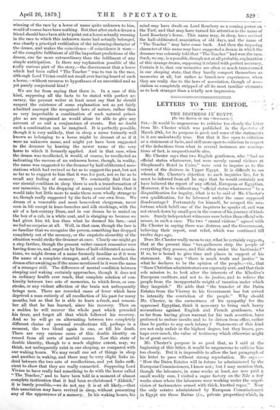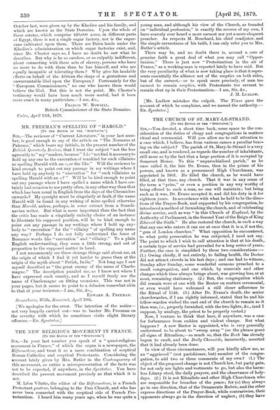LETTERS TO THE EDITOR.
THE DISTRESS IN. EGYPT.
[TO THE EDITOR OF THE"SPECTATOR.']
Sin,—It would be ungenerous to criticise too closely the letter from Mr. Chester which was published in the Spectator. of March 29th, for its purpose is good, and some of the statements in it are undoubtedly true. But that it lies open to criticism as a statement of facts, and still more open to criticism in respect of the deductions from what in several instances are assump- tions of fact, is unquestionable also.
Mr. Chester says that two English gentlemen, who " had no official status whatsoever, but were merely casual visitors at Shepheard's Hotel in Cairo," were sent to inquire as to the extent of the distress in Upper Egypt. It is difficult to see wherein Mr. Chester's objection to such inquiries lies, for it must be inferred from all he says that _ he would certainly not have believed the report of any official, European or Egyptian. Moreover, if to be without any " official status whatsoever " be a disqualification for inquiry, what is to be said of Mr. Chester's own qualification, for he laboured under the same supposed disadvantage ? Fortunately for himself, he escaped the mis- fortune which befell one of the inquirers he speaks of, and was not struck down by small-pox in the course of his journey of kind- ness. Surely independent witnesses were better than official wit- nesses, in such a case. The two " casual visitors " agreed with Mr. Chester in saying there was distress, and the Government, believing their report, sent relief, which was continued till twelve days ago.
Does Mr. Chester really mean to say, what he certainly suggests, that at the present time " tax-gatherers strip the people of everything they possess, and this often under the bastinado ?". If so, he is bound to give time and places in support of his statement. He says " there is much truth and justice " in what he declares to be the opinion of the people,—viz., that " these Christian administrators are expressly sent, and that their sole mission is, to look after the interests of the Khedive's European creditors, and not to do justice, and to relieve the people from the insupportable weight of taxation under which they languish." He adds that " the transfer of the Daira Estates from the Viceroy to his Government has but served to intensify the conviction of the people." Why should Mr. Chester, in the earnestness of his sympathy for the oppressed Egyptian, think it necessary to bring such heavy accusations against English and French, gentlemen, who so far from having given warrant for his rash assertion, have preferred to endure insults and to be driven from office, rather than be parties to any such infamy ? Statements of this kind are not only unfair in the highest degree, but they lessen, per- haps over-much, the value of testimony which otherwise might be of great service.
Mr. Chester's purpose is so good that, as I said at the beginning of this letter, it would be ungenerous to criticise him too closely. But it is impossible to allow the last paragraph of his letter to pass without strong reprobation. He says :- " How the Daira Estates will in future be administered by the European Commissioners, I know not; but I may mention that, though the labourers, in some works at least, are now paid a small weekly sum, I visited a sugar factory on the Nile a fevi weeks since where the labourers were working under the sdper- vision of taskmasters armed with thick, knotted ropes." Now the only estates administered by European Commissioner's in Egypt are those Dairas (i.e., private properties) which, in.
October last, were given up by the Khedive and his family, and which are known as the State Domains. Upon the whole of these estates, which comprise 420,000 acres, in different parts of Egypt, there is not a single sugar factory, nor is the sugar- cane cultivated upon them. There are Daira lands under the Khedive's administration on which sugar factories exist, and, since Mr. Chester says so, I have no doubt he saw what he describes. But why is he so careless, or so culpably indifferent, about connecting with these acts of slavery, persons who have no more to do with them than he has himself, and who are equally incapable of tolerating them ? Why give his laudable efforts on behalf of the African the shape of a gratuitous and unwarrantable libel upon the European Fortunately for the " European Commissioners," no one who knows them would believe the libel. But this is not the point. Mr. Chester's testimony would have been much more useful, had it been more exact in many particulars.—I am, &c., FRANCIS W. ROWSELL, British Commissioner of the State Domains.
Cairo, April 13th, 1879.



































 Previous page
Previous page